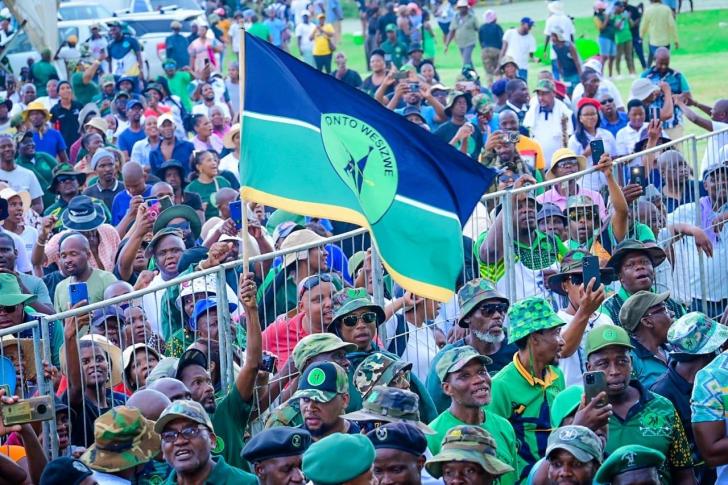News / National
MK Party says 'day of reconciliation' is a colonial facade
16 Dec 2024 at 18:58hrs |
0 Views

The uMkhonto weSizwe Party (MK Party) has issued a scathing denunciation of South Africa's Day of Reconciliation, describing it as a deceptive attempt by the ruling elite to obscure the historical and ongoing suffering of the black majority. In a statement, the MK Party labeled the day as a symbol of unprovoked violence by colonial settlers and a grim reminder of the systemic theft of land, the massacre of innocent Africans, and the institutionalization of white supremacy.
According to the MK Party, the concept of reconciliation remains hollow in the face of entrenched inequalities. The party argues that South Africa's socio-economic landscape starkly reflects the enduring legacy of colonialism, with the black majority continuing to bear the brunt of poverty, unemployment, and systemic marginalization. Despite being framed as a day of unity, the MK Party asserts that reconciliation is impossible without addressing the glaring disparities in land ownership, wealth distribution, and access to basic resources.
The party points to statistics that highlight the persistence of racial inequality: only 4% of the land has been returned to black South Africans, while 80% remains under the control of the colonial elite. Wealth remains concentrated, with 90% held by the white minority, leaving the black majority to scramble for the remaining 10%. Unemployment disproportionately affects black South Africans, who make up 99% of those unemployed, while white South Africans experience near-full employment. The stark divide extends to food security, with 99% of the 25 million South Africans facing hunger being black.
The MK Party also criticized the enduring racial disparities in education and healthcare, stating that black South Africans remain trapped in underfunded and dysfunctional institutions while whites continue to benefit from a system built on apartheid-era privileges. The party expressed outrage at the conditions in which many black children live, highlighting preventable deaths from consuming expired or harmful food and a government they accuse of prioritizing self-serving deals over the welfare of its citizens.
Tracing the origins of the Day of Reconciliation to colonial triumphalism and the establishment of uMkhonto weSizwe in 1961, the MK Party described the day as a stark reminder of the colonial agenda to suppress black emancipation. "It remains a day of terror and massacre," the party declared, "symbolizing the violence inflicted on a peaceful people who welcomed settlers to these shores with humanity."
The MK Party urged South Africans to reject the celebrations associated with the day, calling instead for it to serve as a rallying point for radical change. The party reaffirmed its commitment to land expropriation without compensation, the rewriting of history to restore African values and identities, and the dismantling of entrenched white supremacy.
"There can be no true reconciliation without economic justice, land restoration, and the complete liberation of the black majority," the statement concluded. The MK Party vowed to continue its fight for radical transformation, emphasizing that justice and equity are prerequisites for any meaningful unity in South Africa.
According to the MK Party, the concept of reconciliation remains hollow in the face of entrenched inequalities. The party argues that South Africa's socio-economic landscape starkly reflects the enduring legacy of colonialism, with the black majority continuing to bear the brunt of poverty, unemployment, and systemic marginalization. Despite being framed as a day of unity, the MK Party asserts that reconciliation is impossible without addressing the glaring disparities in land ownership, wealth distribution, and access to basic resources.
The party points to statistics that highlight the persistence of racial inequality: only 4% of the land has been returned to black South Africans, while 80% remains under the control of the colonial elite. Wealth remains concentrated, with 90% held by the white minority, leaving the black majority to scramble for the remaining 10%. Unemployment disproportionately affects black South Africans, who make up 99% of those unemployed, while white South Africans experience near-full employment. The stark divide extends to food security, with 99% of the 25 million South Africans facing hunger being black.
The MK Party also criticized the enduring racial disparities in education and healthcare, stating that black South Africans remain trapped in underfunded and dysfunctional institutions while whites continue to benefit from a system built on apartheid-era privileges. The party expressed outrage at the conditions in which many black children live, highlighting preventable deaths from consuming expired or harmful food and a government they accuse of prioritizing self-serving deals over the welfare of its citizens.
Tracing the origins of the Day of Reconciliation to colonial triumphalism and the establishment of uMkhonto weSizwe in 1961, the MK Party described the day as a stark reminder of the colonial agenda to suppress black emancipation. "It remains a day of terror and massacre," the party declared, "symbolizing the violence inflicted on a peaceful people who welcomed settlers to these shores with humanity."
The MK Party urged South Africans to reject the celebrations associated with the day, calling instead for it to serve as a rallying point for radical change. The party reaffirmed its commitment to land expropriation without compensation, the rewriting of history to restore African values and identities, and the dismantling of entrenched white supremacy.
"There can be no true reconciliation without economic justice, land restoration, and the complete liberation of the black majority," the statement concluded. The MK Party vowed to continue its fight for radical transformation, emphasizing that justice and equity are prerequisites for any meaningful unity in South Africa.
Source - byo24news
Join the discussion
Loading comments…






























